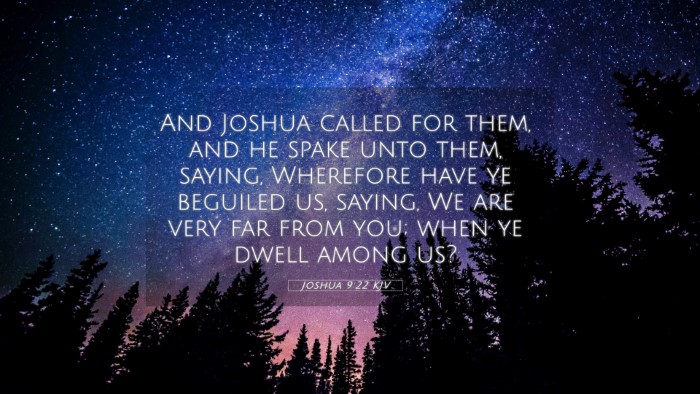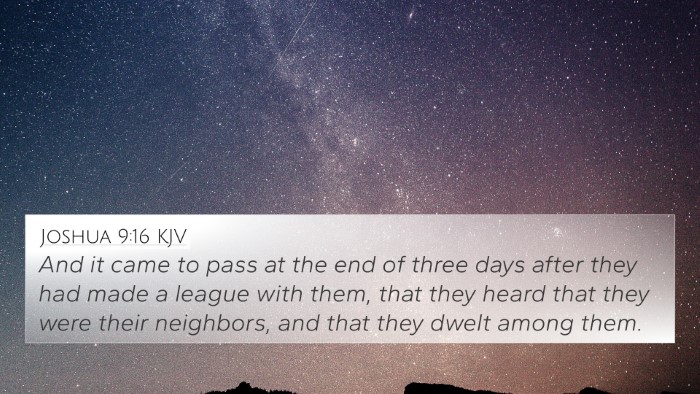Understanding Joshua 9:22
Verse: Joshua 9:22
"And Joshua called for them, and he spake unto them, saying, Wherefore have ye beguiled us, saying, We are very far from you; when ye dwell among us?"
Summary of Meaning
This verse marks a pivotal moment in the narrative of the Gibeonites, who deceived Israel into making a treaty with them. Joshua confronts the Gibeonites, highlighting the theme of deception and the consequences of making hasty decisions without seeking divine guidance.
Insights from Commentaries
- Matthew Henry: Henry emphasizes the importance of discernment and the perils of being misled. He suggests that Joshua’s question underscores the seriousness of their deception and reflects on the broader lesson of seeking God’s wisdom before making covenants or decisions.
- Albert Barnes: Barnes reflects on the covenant made with the Gibeonites and how it serves as an example of how one nation can trick another into agreements. His commentary illustrates the necessity of discerning truth from falsehood, particularly in spiritual matters.
- Adam Clarke: Clarke provides insights into the motivations behind the Gibeonites' actions and the sovereignty of God in allowing such events to unfold. He highlights that, while the Gibeonites acted deceitfully, God's plan ultimately incorporated their actions into His divine purposes.
Thematic Connections to Other Bible Verses
This verse can be contextualized with several other scriptures, illustrating the themes of deception, covenant, and divine guidance:
- Exodus 34:12: "Take heed to thyself, lest thou make a covenant with the inhabitants of the land whither thou goest." This verse warns against entering into agreements without seeking God’s counsel.
- Proverbs 14:15: "The simple believeth every word: but the prudent man looketh well to his going." This underscores the need for wisdom in dealings.
- Isaiah 28:15: "Because ye have said, We have made a covenant with death, and with hell are we at agreement." This passage illustrates the consequences of deceptive agreements.
- 2 Samuel 21:1-6: This reflects on the outcomes of treaties and how they can lead to punishment or consequences under God's guidance.
- Galatians 6:7: "Be not deceived; God is not mocked: for whatsoever a man soweth, that shall he also reap." This verse serves as a moral reminder about the consequences of deceit.
- Matthew 7:15: "Beware of false prophets, which come to you in sheep's clothing, but inwardly they are ravening wolves." This scripture warns of deception in spiritual contexts.
- James 1:5: "If any of you lack wisdom, let him ask of God..." This encourages seeking divine wisdom before making important decisions.
Cross-Referencing Biblical Texts
Joshua 9:22 invites us to reflect on the practice of cross-referencing Bible verses. Understanding this verse in light of related scriptures helps unveil its deeper implications:
Tools for Bible Cross-Referencing
Utilizing a Bible concordance, a Bible cross-reference guide, or engaging in cross-referencing Bible study can bolster one’s understanding of biblical narratives.
Identifying Connections
To enhance your study:
- Consider how the themes of warning against deceit resonate throughout the Old and New Testaments.
- Observe parallels in the treatment of agreements and treaties in various contexts, enhancing your grasp of inter-Biblical dialogue.
- Engage with cross-referenced themes between the Old Testament, such as the Gibeonites’ story, and New Testament teachings on discernment and truth.
Conclusion
Joshua 9:22 serves as a reminder to seek God's wisdom in all matters and to remain vigilant against deception. Cross-referencing with other scriptures enriches the understanding of this verse, encouraging deeper insights into biblical truth and the nature of human interactions.
In summary, this verse, while historical, provides vital lessons on integrity, the necessity of discernment, and the enduring message of God’s guidance throughout scripture.










